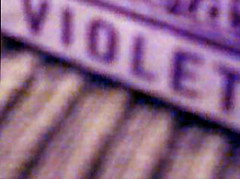Are You Now or Have You Ever Been?: The Investigation of Show Business by the Un-American Activities Committee. USC. 9/13/06.
This was a staged reading of the play Are You Now or Have You Ever Been? presented by the USC School of Theatre and USC's Arts & Humanities Initiative as part of a program called Visions and Voices. It's a program dedicated to sponsoring cultural events at USC throughout the year that encourage dialogue around "core values." While I'm generally dubious about the assertion of "values" as a conservative gesture, the value they're focusing on this year seems to be a focus on freedom of expression. It feels almost revolutionary to see a University encouraging students to speak out and to believe in free speech, and to be aware of violations of that freedom both historical and contemporary.
The play is by Eric Bentley, a prominent theater historian of another generation, most famous for his scholarship on Brecht, who he met at UCLA. Bentley wrote Are You Now or Have You Ever Been in 1972, not too long after he came out of the closet (Theater Scholarship: A Proud Tradition of Liberals and Queers!). The play is composed almost entirely of transcripts and documents from the House Un-American Activities Committee, and as such it can be slow at points, but this production was well-acted by a cast of familiar character actors who really brought the play to life.
The play consists of three members HUAC representing all the committee members over the course of its existence rather than portraying any specific Congressmen (such as McCarthy). Gregory Itzin as the Chairman, however, totally looked like a composite of McCarthy and Richard Nixon. While the Committee members were amalgamations of all the Congressmen who served on the committee, the witnesses were extremely specific. The play presents in aggravating detail some of the ways people responded to the Committee and the ways the Committee attempted to bully witnesses to answer. Act I ended with an moving testimony by Patrick Breen as Larry Parks, who battled with the committee and his conscious and was blacklisted despite his cooperation. This scene was excellent and emotional without being histrionic and it felt deeply like a tragic defeat, as if you could hear this man's life and his spirit breaking thoughout his testimony
Other witnessses depicted in the play included Arthur Miller (played by John Jackson) and Elia Kazan (played by Mark Deakins) and writer/director Abe Burrows played by Stephen Spinella. Laurie O'Brian read Lillian Hellman's famous letter to the HUAC hearings, but buried in text the way it was, "I cannot and will not cut my conscience to fit this year's fashion" didn't have the rousing effect it could and should have had.
In contrast, the show closed with the testimony of Paul Robeson, played by Russell Hornsby. This testimony was a stunning exploration of how Robeson's Communism stemmed from and coincided with his dedication to the rights of African-Americans and people of color throughout the world. It became eerily evident that even if Robeson had no ties to the USSR or the Communist party, just his belief in racial equality and his criticsm of the US as unequal would have been enough to damn him in the committee's eyes. Hornsby portrayed Robeson skillfully, with attention to his deep and powerful voice and striking physical presence. It was a rousing and terrifying conclusion to an impressively interesting play, considering that it is composed entirely of court transcripts.
Thoughout this play, the abuse of power of the government was evident, but almost secondary to the very human responses of very real people. They argued and pleaded and stood strong and broke down. Most importantly, they made strong points about how their involvement with the Communist Party stemmed from idealism and hope and belief in free speech. It demonstrated an awareness of the global situation at the time and a vigorous opposition to Fascism. The government, in contrast, chose to use the techniques of Fascism in interrogating, imprisioning, and frequently destroying the lives and careers of many who had committed no crime. Noticeably, many of the victims at least in the play were Jewish, queer, female, or African-American, or born outside of the U.S. The committee would noticably snicker when any Russian or Eastern-European-sounding name was mentioned. Most terrifyingly to me, when Larry Parks broke down and named names, the chairman very noticably invoked God, making it disturbingly evident that this was a Christian Crusade against godless liberals, who, just because they belonged to a certain organization, were charged with plotting to overthow this country's government. It all sounds very familiar. Bentley's play was a simple but powerful commentary on a disgusting moment in our nation's history that rings all too true and relevant today.
I Interview Playwrights Part 1123: Chester Poon
-
Chester Poon
Hometown: Springfield, MA
Current Town: Brooklyn
Q: Tell me about The Hardest Goodbye.
A: The Hardest Goodbye is my very first play. I...
5 days ago

3 comments:
Crazy--one of the folders of the NAACP papers I read was all the letters and telegrams back and forth between Paul Robeson and the head of the NAACP, Walter White. They were good friends despite severe political disagreements. But when Robeson did his "we black people will not fight against the Soviet Union" speech, White felt like he had to publicly disavow Robeson. It was actually kind of sad to read, there was a lot of anguish for both of them.
You might be interested in these wierd HUAC t-shirts and things They have interesting drawings of famous people like experimental theater advocate and head of the Federal Theater Project Hallie Flanagan Davis testifying before the House Un-American Activities Committee...
Woah. Those are awesome. Thanks!
Post a Comment